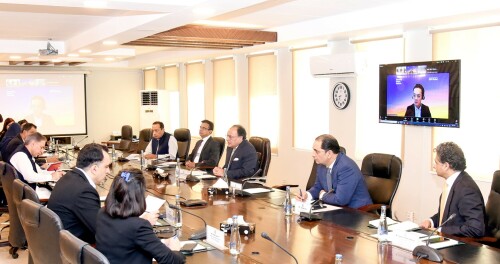Pakistan Aims to Boost Tax-to-GDP Ratio
Finance Minister Muhammad Aurangzeb has announced that Pakistan is projected to elevate its tax-to-GDP ratio to 10.6% by the close of the current fiscal year.
Aurangzeb conveyed this target during a Friday Zoom meeting with representatives from S&P Global Ratings as part of Pakistan’s ongoing Sovereign Ratings Review. He noted this as movement toward the administration’s goal of increasing it to 13% by the time the 37-month Extended Fund Facility (EFF) with the International Monetary Fund (IMF) concludes.
A statement from the Finance Division indicated that Aurangzeb provided a thorough explanation of the government’s macroeconomic reform agenda and affirmed Pakistan’s dedication to attaining sustainable and inclusive economic expansion through enhanced productivity and export promotion.
Key Reform Areas Highlighted
He underscored the continuation of reforms in vital sectors, including taxation, energy, state-owned enterprises (SOEs), privatization, public finance management, streamlining government functions, and implementing more proactive debt management strategies.
Aurangzeb stated that separating the Tax Policy Office from the Federal Board of Revenue (FBR) is part of a broader initiative to align tax policymaking with principles of economic value rather than administrative expediency.
Aurangzeb pointed out that the current account deficit (CAD) and inflation have “remained a positive story throughout the year, favorably impacting overall economic stability.”
He also emphasized that surpluses in both the primary balance and the current account are significant achievements, highlighting the strengthening fundamentals of Pakistan’s economy.
The finance minister communicated confidence in the management of the country’s external portfolio, anticipating foreign exchange reserves to reach $14 billion by the end of June. He said this is “supported by forthcoming institutional and trade inflows, strong remittances, and decreasing oil prices, all contributing to reduced strain on the external account.”
Positive Feedback from International Partners
During the session, the finance minister also shared insights from his recent trip to the United States for the World Bank/IMF Spring Meetings. He reported that feedback from these meetings consistently showed appreciation and support for Pakistan’s structural reforms and macroeconomic stability achieved over the preceding 14 months.
In conclusion, he remarked that international partners have strongly encouraged Pakistan to maintain its current trajectory, deepen the reform efforts, and concentrate on making economic stability a permanent feature.



Comments (0)
No comments yet. Be the first to comment!
Leave a Comment